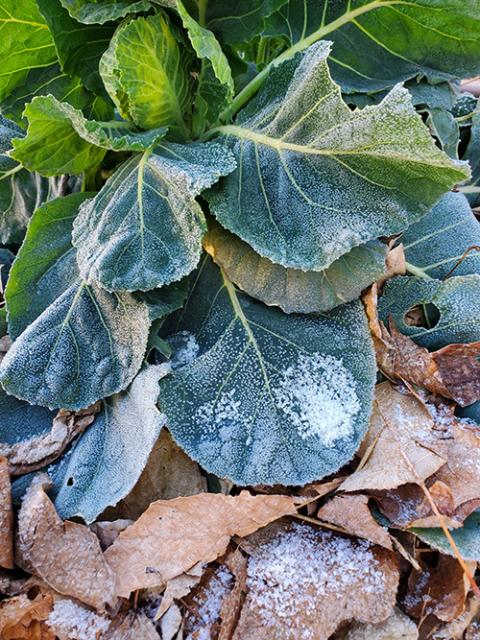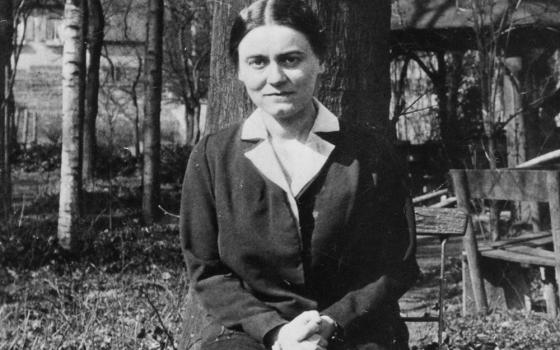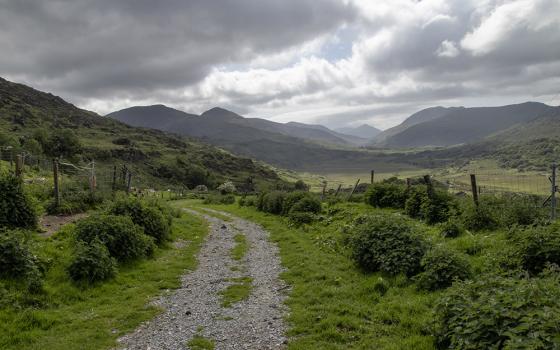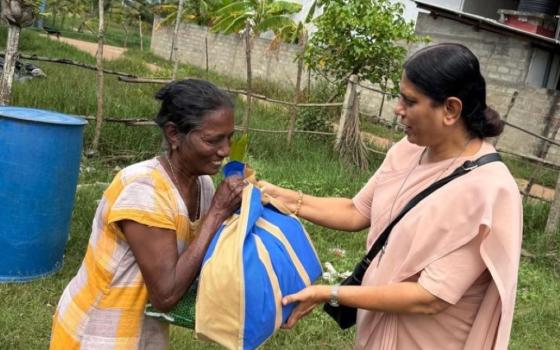
(Dreamstime/Elena Elisseeva)
My community mate and I pull over to the side of the road. We hop out of the car and stuff the large, heavy bags of leaves into the red Prius. We are rescuing these leaves from the landfill and for our backyard garden — a precious resource. We plan to allow these leaves to complete their purpose: to protect our garden's soil and decompose into nutrient-rich soil.
I am delighted that I live in a place that experiences four seasons. Each season is unique — with particular gifts, tasks, and lessons — and an integral part of the cycle of life. A gardener and general lover of the natural world, I often reflect on what the Earth can teach me about life.
So, as fall has gently given way to winter, I reflect on the current state of religious life and religious communities, especially in the United States. For many years, there have been endless conversations about the future of religious life. Sometimes, we approach these conversations propelled by a perception and fear that religious life in the United States is declining. While there has been a decrease in the number of newer members and thus an overall decline in the number of sisters and ministries, I do not believe that religious life is in decline.
Quantum physics confirms that where our attention goes, energy flows. I don’t want a fear-based focus on the future and nostalgic clinging to the past to pull necessary resources from the work of the present. So, I wonder how what I have learned about the four seasons and gardening might offer us guidance. Life on Earth goes in and out of seasons, where forms come and go, decomposing to make new growth possible. We have the capacity and privilege to be co-creators — gardeners — of this life. One of the best ways to support the cycle of life or build a thriving garden is to honor, allow, and tend to each season's work.
As a gardener, I know that if I spend too much energy in fall focusing on what I am going to grow next year and fail to attend to the garden tasks of the season, then I am failing to plan. If we tend well to the business of this season, then we give life the best chance possible to move successfully through the following season.
What about the seasons of religious life or religious communities? I can imagine that religious congregations in the U.S. were experiencing a rather verdant summer in the early to mid-1900s with so much growth, generativity, an abundance of ministries, full novitiates, and expanding missions. Vatican II coincided with a cultural shift across the U.S. Since then, most religious communities have been experiencing fall. (I acknowledge that other communities in the U.S. and other countries are experiencing different seasons.)
Advertisement
In my growing zone, 6A, fall is a season of trees and plants dropping seeds and laying down a blanket of leaves that will protect the soil and its microbiome during winter. These leaves will also provide nutrients for new growth as they decay. It is also when squirrels and other small mammals fatten up and store food to get them through winter. In the garden, we pull in the last bit of the harvest and prepare the garden for winter.
So, what can we gather from these observations? Many religious communities have been and are experiencing this season of letting go, slowing down, harvesting. What if we approached these natural tasks with joyful celebration and careful preparation? Perhaps we can take stock of and offer gratitude for the abundance of life and love that religious persons have poured into others. Let us celebrate that countless people have eaten of the abundant harvest. Communities might grieve the loss of ministries, buildings, members and institutions, preparing the soil of our hearts for new possibilities. This season also asks us to let go of long-held identities, beliefs and constructs by honoring what was — acknowledging their teachings and gifts — and realizing what no longer serves us.

(Unsplash/Kira auf der Heide)
Some communities are like annual flowers dropping their seeds, covering them with care, and trusting that something new will emerge after they are gone. Their form will give way and decompose, returning the gift of life to the divine to use for its next magnificent creation.
Soon, fall will give way to winter, or perhaps it already has. Winter, a season where all seems dead and cold, is an integral part of the cycle. Winter is a season of dormancy, necessary rest, and a return to the roots that will sustain another season of new life and growth.
Perhaps the winter of religious life is an opportunity to find out who we are without the large number of sisters, ministries and institutions. Withdrawing from external growth and generativity, we sink deep underground, focusing our energy inward. Here we can connect with and listen to what is true, to our divine essence. Let me name that in the Western, capitalistic culture rest is frowned upon — or worse demonized. This is a toxic approach that drains without replenishing. Not resting — pushing through or sucking it up — leads to depletion and death that robs life of the opportunity to continue in creative, generative and sustainable ways.
If we pause, allow ourselves to rest, sit around the fire, remember what is essential, and companion each other through the winter, we will emerge strong and rooted. We increase our capacity to support the transformation of the world. Perhaps this is the current task of many religious communities in the U.S. I imagine that this might be hard to hear because our lives are so focused on meeting the needs we see in the world. I am not saying we should stop doing what we are doing. However, we need to create moments of rest, stillness and listening in order to respond more gracefully and skillfully to the tasks at hand.
Not resting — pushing through or sucking it up — leads to depletion and death that robs life of the opportunity to continue in creative, generative and sustainable ways.
Rest is not selfish; it is resistance and resilience. Earth is not selfish during winter; she is wise. We do not need to frantically figure out the future of religious life or even ensure that it continues — that is God’s work. May we wisely participate in this unfolding. Let us tend to whatever season we find ourselves in, trusting in the cycle of life — the paschal mystery — that moves on with or without us.
After my sisters and I have tucked our garden under a bed of rescued leaves and chopped all the dead plants into the compost pile, we rest, reflect and dream. Slowly, the plan for next year emerges. When it is time, we take the necessary steps to prepare for the next growing season. With trust, I willingly enter and honor the winter of many Catholic religious communities. Let us rest, reflect around the fire, and return to our essence so that we can emerge ready to be a part of the big dream God has for the world.








